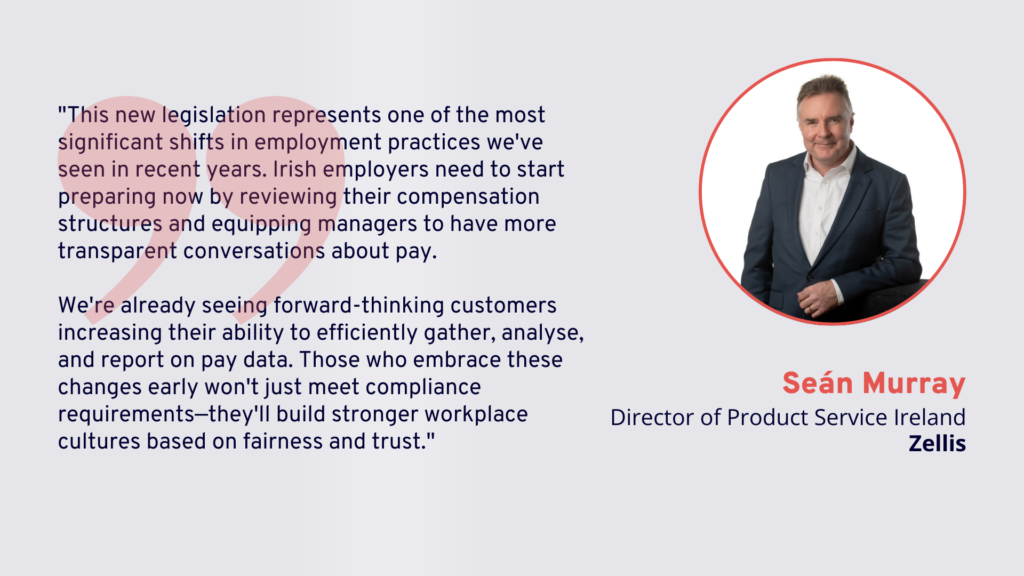Pay transparency requirements are set to transform Irish workplaces as the government begins transposing the EU Pay Transparency Directive into national law through the Equality Bill. By early June 2026, the legislation will ban salary history questions during recruitment, require pay ranges in job advertisements. It will also give employees new rights to compensation information. Seán Murray, Director of Product Service Ireland, explains.
In this blog
About the EU Pay transparency Directive
How the Equality Bill impacts Hr policies
About the EU Pay Transparency Directive
The EU Pay Transparency Directive, which came into force in June 2023, is a complex piece of legislation aimed at addressing concerns around the principle of equal pay for men and women by ensuring transparency in pay setting and progression, eliminating pay secrecy, and strengthening enforcement mechanisms. Ireland is obliged to adopt the new rules by 7th June 2026.
On 15th January 2025, the Irish Government began transposing some of the requirements of the directive by publishing a General Scheme of the Equality (Miscellaneous Provisions) Bill 2024, including provisions for enhancing pay transparency prior to employment. With the bill in the early legislative stages, Ireland is only the fourth EU member state to make such a move.
How the Equality Bill impacts HR policies
The new law will require some key adjustments to established HR practices in Ireland. From recruitment and compensation to internal communications and data management, HR teams should prepare for a more transparent approach to pay.
Pay transparency in recruitment
Once the law is passed, companies will have to disclose the details of pay levels or ranges to candidates by including them in job advertisements. They will also no longer be allowed to ask about pay history or current pay to inform job offers.
Impact on gender pay gap reporting
Beyond the two measures above, the EU Pay Transparency Directive includes requirements to publish gender pay gap figures (above a certain employee threshold) and undertake joint pay assessments in certain instances.
Read our blog about gender pay gap reporting in Ireland under the EU Equal Pay and Pay Transparency Directive for more about this.
Information rights for workers
Companies with more than 50 employees will have to inform workers about the criteria used to determine pay and pay progression. And employees will have the right to request information on average pay levels, according to sex, for categories of workers doing the same work or work of equal value. Employers will need to provide this within two months. The legislation will also prohibit pay secrecy clauses in the future.
Impact on HR policies
Organisations should assess their readiness to comply with the directive from the legal, operational, and strategic standpoints. This includes reviewing grading structures (to allow reporting by worker category), pay progression criteria, and data systems. Managers will need to be ready to answer questions about compensation and understand pay equity risks across the EU.
How employers can prepare

“This new legislation represents one of the most significant shifts in employment practices we’ve seen in recent years. Irish employers need to start preparing now by reviewing their compensation structures and equipping managers to have more transparent conversations about pay. We’re already seeing forward-thinking customers increasing their ability to efficiently gather, analyse, and report on pay data. Those who embrace these changes early won’t just meet compliance requirements—they’ll build stronger workplace cultures based on fairness and trust.”
Seán Murray, Director of Product Service Ireland, Zellis
- In the recruitment process, carefully consider the salary ranges for inclusion in job ads, and avoid asking candidates about prior or current salary.
- Think about how ‘categories of workers’ might be defined, and identify roles ‘of equal value’ in terms of skill, effort, and decision-making by using job evaluation methodologies.
- Review remuneration and career progression policies while investigating possible pay gaps or areas open to allegations of bias or discrimination. Check that there are no policies which may prohibit pay discussions.
- Set up an efficient process to deal with pay information requests. Review data systems (collection and storage) to ensure they allow the processing of these requests in a reasonable time frame.
Conclusion: Be ready for pay transparency
The new pay transparency rules will bring practical changes to how Irish companies handle compensation information, creating more open conversations about pay across workplaces. While there’s work to be done updating HR systems and policies, these changes offer a real chance to build fairer pay practices. Organisations that embrace transparency early will likely find it easier to attract and retain talent, as job seekers increasingly value employers who are upfront about compensation and committed to equal pay.
Key takeaways
- Pay transparency legislation is coming to Ireland by June 2026 through the Equality Bill, with employers required to include salary ranges in job adverts and prohibited from asking about salary history.
- Companies with more than 50 employees will need systems in place to respond to worker requests for pay information within two months of receiving them.
- Organisations should begin reviewing their job evaluation methodologies now to identify roles of equal value ahead of implementation.
- Pay secrecy clauses will be prohibited under the new legislation, creating a more open compensation culture in Irish workplaces.
- Early adopters of transparent pay practices are likely to benefit from enhanced reputation and trust with both current employees and potential recruits.
Are you in charge of HR or payroll in Ireland?
Discover useful resources to help you get to grips with issues and challenges of the day.









